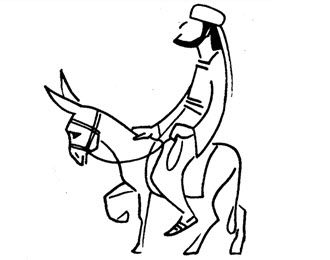No king like all the nations (1)
14-07-2025 - Posted by Geert-JanOriginally posted on June 02, 2025 – by Andre Piet
Politics is omnipresent. Elections, debates, promises and, often shortly thereafter, the sobering reality. Power games, popularity, and rivalry determine who rules. But what does Scripture say about these things? In Deuteronomy 17 we read the unique and groundbreaking model that God gave to Israel. It is not a law for the people, but a constitution to which the king would be subject.
Israel without a king
The people of Israel initially had no king at all. When Moses spoke these words, the people were on the verge of entering the promised land. A period would follow of centuries without a king, the time of the judges. Israel then had judges: independent, adjudicating individuals who were called upon in times of conflict. When the people listened to their God, there was rest and peace.
why then a king?
However, God foresaw that Israel would at some point say: “I want to appoint a king over me, like all the nations around me have” (Deut. 17:14). This motive—resemblance to the nations—later turned out, in 1 Samuel 8, to be the driving force: they wanted military security and control. God warned Samuel: in doing this, they are not rejecting you, but Me (1 Sam. 8:7). The people did not want to depend on God, but on a tangible security. An army. And a king who would fight their wars.
but then a different kind of king
But if Israel would indeed appoint a king, God beforehand laid down clear conditions. He would not be a king like the nations knew. Not a foreign ruler who exalted himself, but a brother. Chosen by God, not by the people (verse 15). So no elections, no rivalry. God would choose—through a prophet or by lot. Because He is their God and King (1 Sam. 8:7).
three clear restrictions
Israel’s king was required to meet three essential conditions—three prohibitions, which radically differed from common models of kingship:
- No great number of horses (verse 16)
In ancient times, horses symbolized military power (cf. Ps. 33:16,17). Egypt was especially prominent in this. But Israel was not to trust in military power or chariots. No return to Egypt, the land of slavery. The lesson? YAHWEH would be their warrior (Ex. 15:3), not an army. Salvation would come from Him, as was often proven in the time of the judges. Faith, not military power, was the foundation. - No great number of wives (verse 17a) This is not a moralistic command, but a political one. For “many wives” inevitably meant: diplomatic alliances (1 Kings 11:1–3). Marriages with daughters of other kings. With them came their idols and ideas into Israel. Solomon is the prime example of this. His wives, mostly of foreign origin, turned his heart away from YAHWEH. The king was to remain independent of other powers.
- No excessive silver and gold (verse 17b) Here too the goal is clear: no financial superpower, no state treasury from which everything is financed. No costly projects or an army. The people’s money belonged with the people. The king had no need for a treasury—he trusted in YAHWEH. This sharply contrasts with the present-day situation, in which the state is immensely wealthy and forces citizens to surrender an ever-larger share of their income.
the true king: humble and learning
The king of Israel had a remarkable task: when he sat on his throne, he was to personally write out a copy of the law and carry it with him at all times (verses 18–19). Not a secretary or clerk, but he himself had to write, read, and cherish the words. Reading—literally: proclaiming aloud—so that he would hear it, taste it, speak it. This instruction would be his guide, so that his heart would not exalt itself above his brothers.
What a contrast! Not an exalted ruler, but a humble brother. Not a tax collector, but a servant. Not a warlord, but a reader of Scripture. Not a diplomat, but a disciple of God’s Word.
behold, your king is coming!
The prophetic climax of all this is found in Zechariah 9:9:
“Behold, your king is coming to you, righteous and having salvation, humble and riding on a donkey…”
No horse, no chariot, no sword. But a donkey, the means of transport for a humble king. An image we know from Jesus entering Jerusalem on a donkey (Matt. 21:5). He is the true fulfillment of Deuteronomy 17. A king from the people, chosen by God, without army, without wives, without gold.
And note what follows in Zechariah 9:10:
“I will cut off the chariot from Ephraim, and the horse from Jerusalem; the war bow will be broken. He will speak peace to the nations.”
He will be the king who abolishes war and brings peace—to the ends of the earth. Israel’s royal law finds its ultimate fulfillment in the aeon that is about to come!
This article is an adaptation of this address.

 English Blog
English Blog